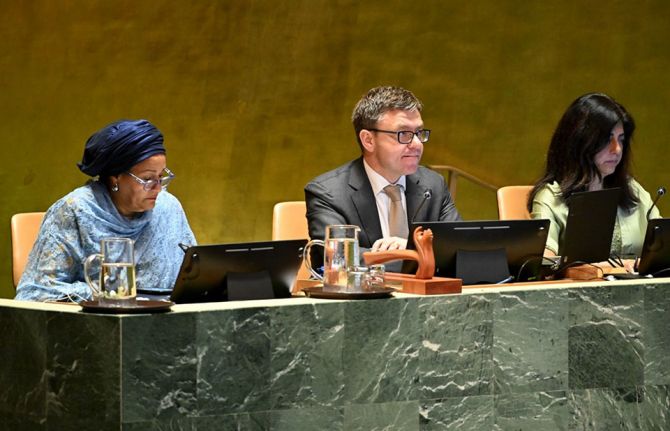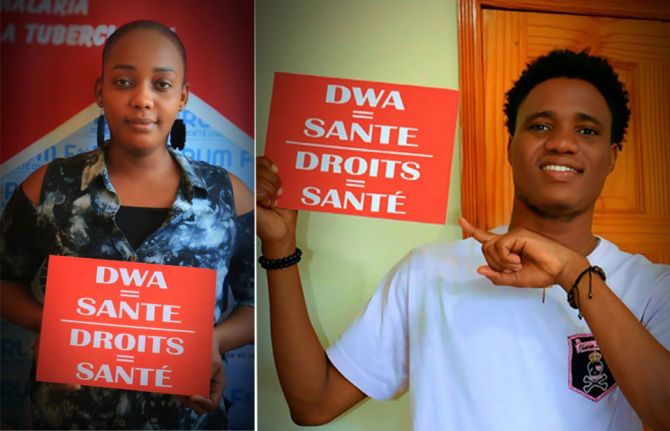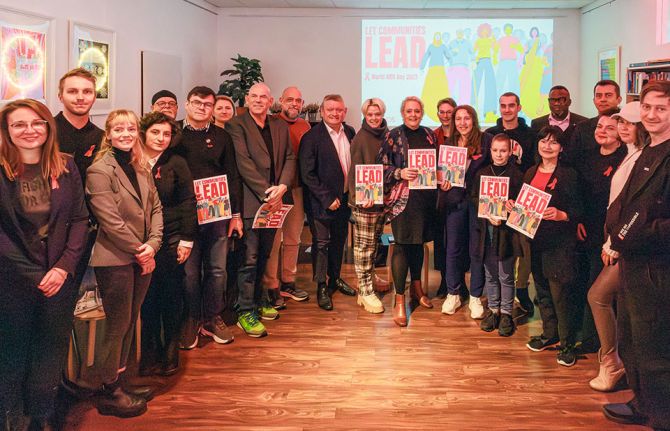
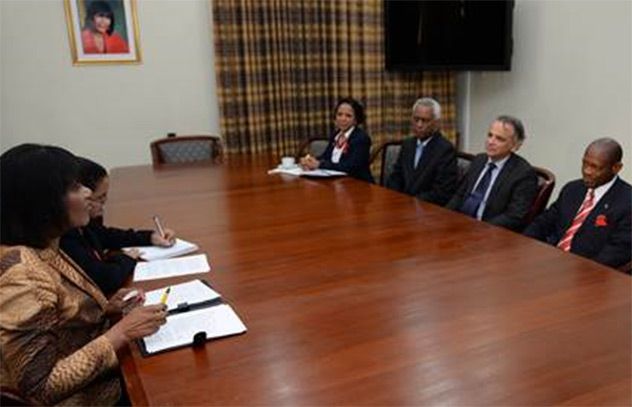
On 9 April a high-level delegation of international partners involved in the response to HIV met with the Jamaican Prime Minister, the Most Honourable Portia Simpson Miller.
Update
Jamaica to boost progress in the region against HIV
14 April 2014
14 April 2014 14 April 2014On 9 April a high-level delegation of international partners involved in the response to HIV met with the Jamaican Prime Minister, the Most Honourable Portia Simpson Miller, to discuss the country’s role in accelerating the Caribbean’s efforts to end stigma and discrimination and reduce new HIV infections and AIDS-related deaths.
The visiting delegation included the Prime Minister of St Kitts and Nevis, Denzil Douglas; the United Nations Secretary General’s Special Envoy on HIV for the Caribbean, Edward Greene; UNAIDS Deputy Executive Director, Luiz Loures; and the Executive Director of the Global Fund to Fight AIDS, Tuberculosis and Malaria, Mark Dybul.
The issue of the importance of full respect for human rights was discussed, as was the need to collaborate with other countries on innovative approaches to strengthen HIV responses. The challenges regarding the balance of financial responsibility between Caribbean countries and international partners for sustaining HIV responses was also high on the agenda.
The Global Fund reiterated its role as part of a worldwide partnership to support countries in responding to HIV and announced a US$ 10 million grant to Jamaica to support its continued efforts in HIV prevention, treatment and care.
UNAIDS offered to facilitate an exchange of ideas between the African Union and the Caribbean Community (CARICOM) on the principles of shared responsibility and global solidarity to propel efforts toward ending AIDS.
Quotes
"Jamaica is working with all sectors, and paying specific attention to the vulnerable and the poor, to lift the masses in the post-2015 agenda, and to keep the people hopeful."
"We have the knowledge and the tools to combat HIV but we have big pockets of people being left behind."
"The Justice for All programme provides a space for dialogue and advancing the human rights agenda for the HIV response. In the process we can work to ensure that those who are recognised as being vulnerable can get justice and equality in Caribbean societies."
Related
 Comprehensive Update on HIV Programmes in the Dominican Republic
Comprehensive Update on HIV Programmes in the Dominican Republic

19 February 2025


From left to right: Tina Draser, Global Fund; Ronald Tran Ba Huy, Global Fund; Joshua Galjour, Global Fund; Mamadou Diallo, UNAIDS.
Update
Launch of the new funding model of the Global Fund in West and Central Africa
10 April 2014
10 April 2014 10 April 2014The new Global Fund to Fight AIDS, Tuberculosis and Malaria (Global Fund) funding model was presented to key actors in the AIDS response in West and Central Africa during a workshop organized by UNAIDS and the Global Fund in Dakar, Senegal, from 2 to 3 April.
This new funding model allows the Global Fund to focus on countries with the highest disease burden and least resources available and gives a more flexible timeline for countries to adapt to it. Eligible countries may apply at any time during the three-year allocation period so that funding can be aligned with national budgeting cycles and country-specific demands. The funding application process has also been simplified and eligible countries are encouraged to base their request to the Global Fund on their national strategy or investment case.
Through a series of presentations, more than 260 participants, including representatives of ministries of health and finance, national aids councils, civil society, key populations and international organizations, learned the process to develop—through multipartner consultations—a streamlined concept note to present funding requests to the Global Fund.
This new funding model is launched at a time when countries are in the process of setting new targets to guide their principles beyond 2015. Participants emphasized the need to mobilize more domestic funds for national HIV responses and to use the Global Fund as an additional source that would complement the resources provided by the state.
Quotes
“The new funding model proposes a more flexible calendar, with at least a 90% success rate and a faster disbursement of funds.”
“For UNAIDS, the new funding model is a platform of choice for achieving the targets set for 2015 and bring us closer to our vision of an AIDS-free generation.”
Related
 Impact of the pause of US foreign assistance in Côte d'Ivoire
Impact of the pause of US foreign assistance in Côte d'Ivoire

19 February 2025

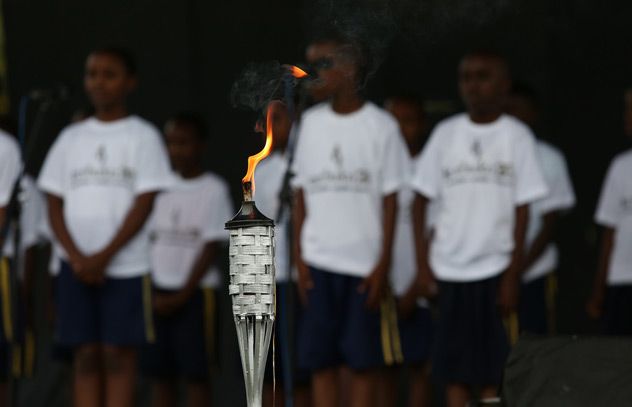
Credit: www.kwibuka.rw
Update
Twenty years on, Rwanda remembers the victims of the genocide
07 April 2014
07 April 2014 07 April 2014United Nations Secretary-General Ban Ki-moon and UNAIDS Executive Director Michel Sidibé on 7 April joined President Paul Kagame and First Lady Jeannette Kagame, African leaders, representatives of the international community and the people of Rwanda to light the national flame of mourning. The flame will continue to burn for the next 100 days at the Kigali Genocide Memorial Centre to honour the victims of the genocide.
Since 1994, Rwanda, together with the international community, has made remarkable progress in bringing the perpetrators of the genocide to justice and rebuilding a peaceful, healthy and productive nation through an equitable health and development strategy.
Extensive sexual violence against women and girls during the 100 days of the massacre left many female Rwandan genocide survivors infected with HIV. However, over the past 20 years, Rwanda has made significant efforts to scale up the national AIDS response. In 2012, an estimated 210 000 people were living with HIV in Rwanda and 81% of the people who were eligible for HIV treatment under the World Health Organization’s 2013 guidelines had access to antiretroviral therapy. New HIV infections in Rwanda declined by 54% between 2001 and 2012, from 17 000 to 7 800, while AIDS-related deaths decreased sharply, from 23 000 to 5 600, within the same period. Rwanda is on the right track to ensure universal access to HIV prevention, treatment, care and support services.
Quotes
“We honour their lives through remembrance and reflection, but also through doing everything that we can to improve protection, response and safeguarding populations from genocide and other atrocities. We stick together—we stay together. That is our pledge to Rwanda and the world.”
“We did not need to experience genocide to become a better people. It simply should never have happened. No country, in Africa or anywhere else, ever needs to become another Rwanda. But if a people’s choices are not informed by historical clarity, the danger is ever present.”
“We are here today to reflect on one of the darkest periods in our history, when almost a million Rwandan people lost their lives and thousands more suffered brutal mutilation and rape. We are also here to show that we stand in solidarity with the government and the people of Rwanda to build an economically and socially powerful country that is fair and safe for all.”
Related

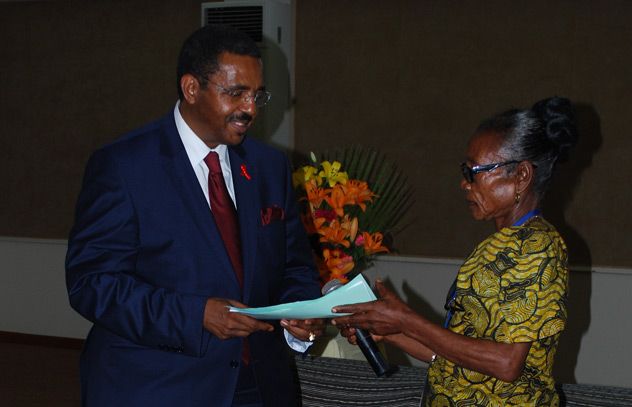
Assita Marie Kpanamna, representing the communities and people living with HIV in Central Africa Republic handing over the unanimously agreed call for action to Dr Mamadou Diallo, RST WCA Director
Update
Scaling up access to HIV treatment in West and Central Africa
04 April 2014
04 April 2014 04 April 2014AIDS experts from West and Central Africa participated in the first regional consultation to define new targets to ensure universal access to HIV treatment in the region. Held in Dakar, Senegal from 31 March to 1 April, the event was organized by UNAIDS, in collaboration with WHO and the Global Fund to Fight AIDS, TB and Malaria.
The discussions focused on the scientific, technical, political and financial aspects of the expansion of HIV treatment in the region.
Taking into consideration the evidence showing that early initiation of HIV treatment saves lives, prevents opportunistic infections, stops sexual transmission of HIV and saves cost in the long run, participants issued a call for action stating that access to HIV treatment should be considered a human right and that each person living with HIV should have the right to receive treatment.
More than 150 participants attended the event representing national AIDS councils and other governmental organizations, including Ministries of Finance, civil society organizations, the private sector, associations and networks of people living with HIV, the network of African Men for Sexual Health and Rights as well as technical and financial partners from 25 countries from West and Central Africa.
Quotes
“Today, we have a unique opportunity to write the final chapter of the AIDS history. To be able to do so, it is important to seize the opportunities offered by the new funding model of the Global Fund, the investment cases and the revision of the national strategic plans. These will lay in 2015 the foundations of ambitious and visionary targets that will enable us to go to scale from now to 2020.”
“Early initiation of HIV treatment is key. We can now make the difference, save lives and prevent new HIV infections, even eliminate HIV in the upcoming generation. I pledge to mobilize, once back home, the AIDS community so that we urgently decide what to do for all Mauritanians living with HIV to have early access to HIV treatment.”

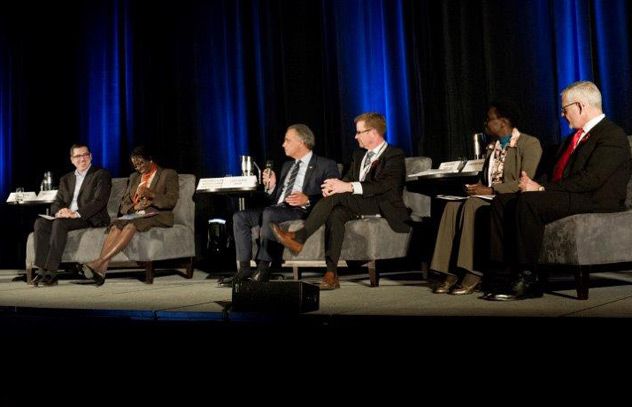
Participants during the HIV treatment meeting.
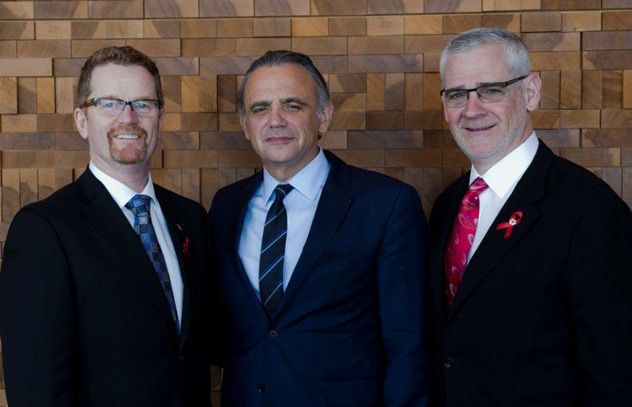
Terry Lake, British Columbia Health Minister, Luiz Loures, UNAIDS Deputy Executive Director and Julio Montaner, Director of the British Columbia Centre for Excellence in HIV/AIDS during the HIV treatment meeting.
Update
Experts call for accelerating progress towards universal HIV treatment access
03 April 2014
03 April 2014 03 April 2014Scientific experts from 41 countries have gathered in Vancouver, Canada for a four-day meeting to examine the latest evidence regarding the prevention benefits of antiretroviral therapy. The meeting also focused on developing new targets to end the AIDS epidemic, including a commitment to bring HIV treatment to all people who are eligible.
Citing both the therapeutic and preventive benefits of antiretroviral treatment, participants emphasized that available evidence justifies a rapid implementation of the World Health Organization’s 2013 consolidated guidelines on the use of antiretroviral drugs for treating and preventing HIV infection —which markedly expands the number of people living with HIV who are eligible for antiretroviral therapy.
Vancouver’s proactive scale-up and innovative service delivery of HIV testing and treatment was hailed as a reference of the cost-benefits of HIV treatment expansion. Its approach is now being emulated in countries and localities worldwide as a successful model in the AIDS response.
Participants stressed the importance of removing all forms of punitive legal and policy frameworks that deter people from seeking health services in order to leave no one behind. They emphasized that community leadership and engagement are still vital elements of long-term success. Grenada’s Minister of Health Clarice Modeste-Curwen led a call for renewed global solidarity to mobilize sufficient resources to finance rapid HIV treatment scale-up.
The meeting was co-convened by the British Columbia Centre for Excellence in HIV/AIDS and UNAIDS, and included participation from UNAIDS cosponsors leading on HIV treatment including WHO and UNICEF.
Quotes
“Look at the evidence and the economics.”
“Seeing what the epidemic was like years ago, I never thought in my lifetime we would be speaking about the possibility to end the AIDS epidemic. However, there is still uneven access to HIV services especially among key populations. We need to better understand and act on local epidemics and this is much easier to do if we bring services closer to communities and to people.”
“There is often lip service about community systems strengthening; however the money is not trickling down to the community.”
“Finally there is a consensus emerging that the science clearly demonstrates HIV treatment is highly effective in stopping transmission in all contexts.”
Related

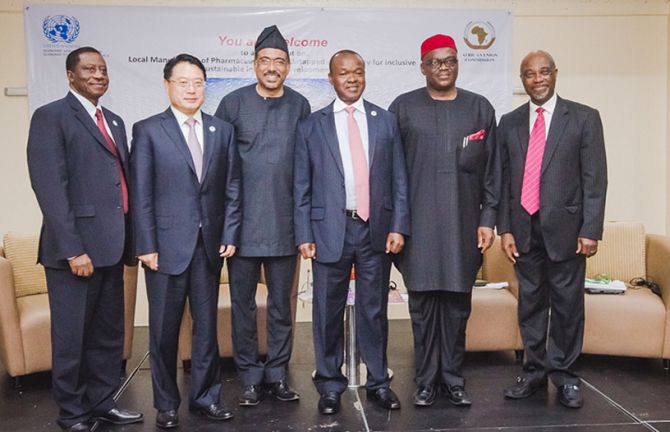
From left to right: Mustapha Sidiki Kaloko, African Union Commissioner for Social Affairs; LI Yong, Director General of UNIDO; Michel Sidibé, UNAIDS Executive Director; Erastus Mwencha, African Union Commission Deputy Chairperson; Onyebuchi Chukwu, Nigeria’s Minister of Health; Paul Lartey, Chief Executive Officer of the Federation of African Pharmaceutical Manufacturers Associations.
Update
Agreement to accelerate the local production of medicines in Africa
31 March 2014
31 March 2014 31 March 2014UN leaders and the African Union agreed at a meeting held in Abuja, Nigeria, on 30 March to join together to respond to the challenges that the pharmaceutical industry in Africa is facing in strengthening the local production of essential medicines and moving the continent towards sustainability of treatment programmes for HIV, tuberculosis and malaria.
The meeting was held on the sidelines of the Seventh Joint African Union Conference of Ministers of Economy and Finance and the UNECA Conference of African Ministers of Finance, Planning and Economic Development.
Africa is highly dependent on foreign medicines, with 70% of them being imported; local production of quality medicines is therefore imperative to guaranteeing life-saving treatment in Africa. Local production will result in many benefits, including better quality assurance, shorter supply chains and fewer stock-outs.
Since one of the major challenges for the pharmaceutical industry in Africa is the establishment of an African regulatory agency, the participants agreed that their next meeting will focus on that issue.
Quotes
“Access to affordable and quality medicines is critical to achieving our shared goal of ending AIDS, ending extreme poverty and reducing the burden of other diseases. Solidarity on global health is essential and imperative. It is value for money. It saves lives.”
“I really believe we should work together if we want to see a sustainable pharmaceutical industry developed in Africa.”
“We are on the right path. I am impressed by the work of the regional economic communities and the UN agencies.”
“We should take into account what the regional economic commissions have achieved, and build on it.”
“We must develop a business case if we want to convince African banks to invest in the pharmaceutical industry.”
“We are the strongest advocate for the implementation of the business plan of the Pharmaceutical Manufacturing Plan for Africa.”

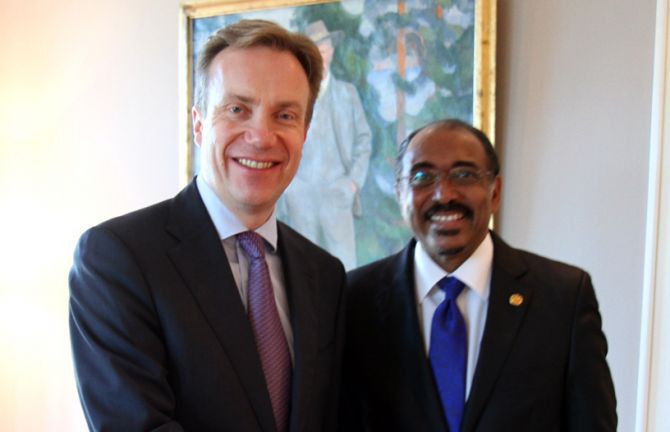
Norway's Foreign Affairs Minister Borge Brende with UNAIDS Executive Director, Michel Sidibé. 24 March 2014. Oslo, Norway
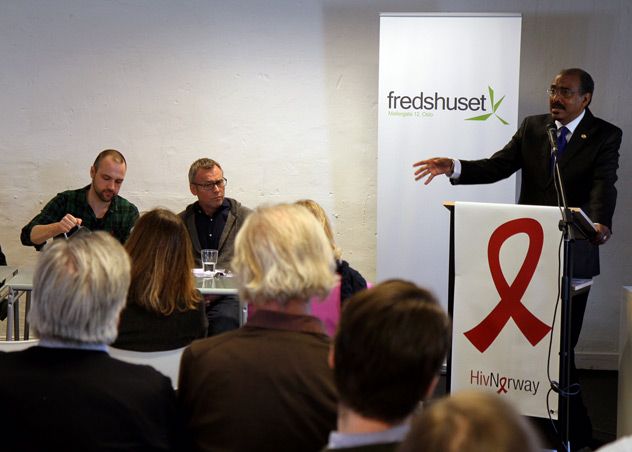
The Executive Director of UNAIDS Michel Sidibé visited Norway on 24 March to further action towards ending the AIDS epidemic.
Update
Norway urges knowledge and tolerance to advance the response to HIV
26 March 2014
26 March 2014 26 March 2014The Executive Director of UNAIDS Michel Sidibé visited Norway on 24 March to further action towards ending the AIDS epidemic. He met with a range of partners including representatives from government, civil society and the media. In discussions with the Ministry of Foreign Affairs, NORAD, and the Ministry of Health he underlined the tremendous progress being made in saving lives and preventing new HIV infections. He also expressed confidence that the target of 15 million people on antiretroviral therapy by 2015 will be reached if efforts continue to be scaled up.
Mr Sidibé thanked Norway for its longstanding support to the AIDS response and to UNAIDS and requested its continued engagement to ensure that no one is left behind. He called for a global solidarity around ending the AIDS epidemic as part of the post-2015 development agenda.
Priorities for Norway include looking for synergies across the development agenda and continuing support for human rights. Norway's Foreign Affairs Minister Borge Brende stressed Norway’s commitment to achieving the Millennium Development Goals (MDGs) and to ensuring that the most vulnerable and marginalized in society have access to life saving HIV prevention and treatment services.
The visit to Norway was followed by a consultation with four Nordic governments—Norway, Denmark, Sweden, and Finland—to discuss how to accelerate progress towards the MDGs and how best to support countries in their efforts towards ending AIDS.
Quotes
“AIDS is a stark reminder of inequities in society and the lack of social justice. Young women, sexual minorities and marginalized populations continue to be disproportionately affected by HIV. AIDS cannot be addressed in isolation––it is interwoven with social justice and human rights."
“It is important to uphold a focus on women, girls and youth as well as on marginalized key populations. The discrimination of sexual minorities in many countries represents great human rights concerns, and has a negative impact on the AIDS response. Knowledge and tolerance needs to be increased on all levels of societies.”
Related

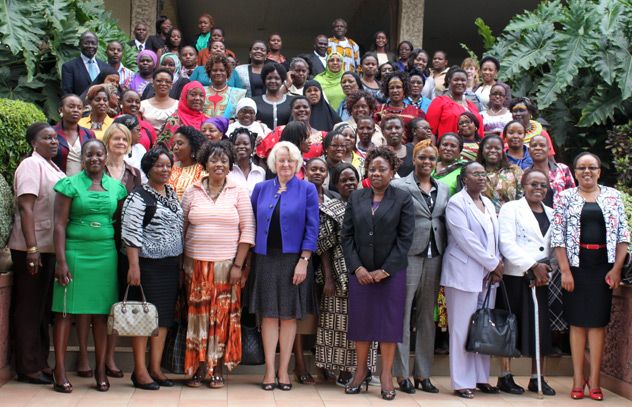
UNAIDS Deputy Executive Director Jan Beagle joined representatives of women’s rights organizations in Kenya to discuss ways to stop mother to child transmission of HIV in the country.
Update
Kenyan women unite to increase access to maternal and child health
26 March 2014
26 March 2014 26 March 2014More than 100 leaders and representatives of women’s rights organizations from across Kenya came together on 24 March in Nairobi to discuss ways to stop new HIV infections among children by 2015 and improve the health of mothers in the country.
The women’s rights leaders meeting was co-organized by UNAIDS, UNDP, the National AIDS Control Council, the National AIDS and STI Control Programme and the Community Advocacy and Awareness (CRAWN) Trust. The event aimed to accelerate the momentum started by the First Lady of Kenya Margaret Kenyatta through the Beyond Zero campaign—an initiative to end mother-to-child transmission and AIDS-related maternal deaths in Kenya.
Speaking at the meeting, UNAIDS Deputy Executive Director Jan Beagle applauded the First Lady’s personal commitment and stressed that for UNAIDS, gender equality and human rights—including sexual and reproductive health rights—are non-negotiable elements to ensure effective HIV and health responses.
Government figures show that in Kenya AIDS-related illnesses account for one in five maternal deaths and 100 000 children under the age of 5 years died from preventable causes in 2012. According to WHO figures, Kenya currently dedicates 6% of its national budget—less than half of the 15% Abuja Declaration target—to the health sector.
Quotes
“We need to leverage synergies across movements, bringing together the capacity and innovation of the AIDS response with movements to advance sexual and reproductive health and rights, gender equality and the empowerment of women and girls."
“Our involvement as the women’s movement is a game changer and will catalyse actions needed to bring the necessary changes and accelerate the achievement of the Beyond Zero campaign goals.”
Related

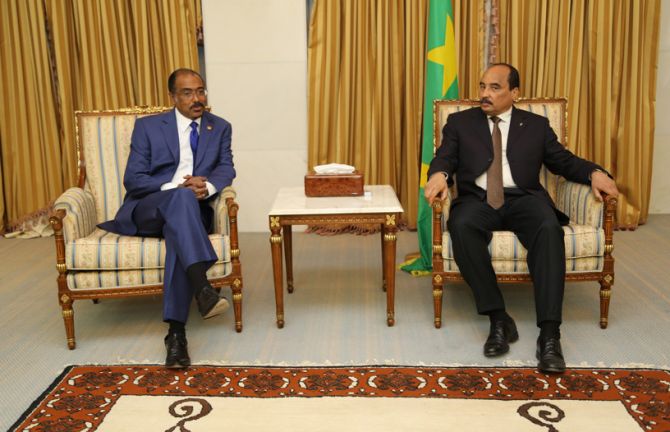
Executive Director of UNAIDS, Michel Sidibé meets with newly elected chair of the African Union and President of Mauritania Mohamed Ould Abdel Aziz in Nouakchott, Mauritania. Credit: UNAIDS
Update
Mauritanian President to support African leadership in AIDS response as new AU Chair
21 March 2014
21 March 2014 21 March 2014The President of Mauritania and new Chair of the African Union (AU) will support African leaders in increasing action in the response to HIV. President Mohamed Ould Abdel Aziz met with the Executive Director of UNAIDS, Michel Sidibé on 20 March in Nouakchott, Mauritania. Mr Sidibé congratulated the President on his recent election to the rotating presidency of the AU and urged him to lead efforts to accelerate transformative reforms in the responses to AIDS, tuberculosis and malaria.
In 2012, African leaders committed to a Roadmap on Shared Responsibility and Global Solidarity for AIDS, TB and Malaria Response in Africa, charting a new course for the continent’s response to the three diseases. Mr Sidibé stressed the urgent need for African countries to take ownership of their epidemics and reduce dependency on international financing. He also reiterated the need to produce antiretroviral and other essential medicines on the continent and build capacity and knowledge on the production of medicines.
As well as playing a leading role in the African Union, Mauritania is also a member of the League of Arab States, which earlier this month endorsed a highly innovative strategy to halt the AIDS epidemic in Arab countries. Mr Sidibé pointed out that while Africa is the region most affected by HIV in the world, the Arab region has one of the fastest growing epidemics globally. Since 2001 the number of people newly infected with HIV in Arab countries has increased by more than 47%. He called on Mauritania to leverage its unique position and act as a bridge between African and Arab institutions, spurring the transfer of key know-how and technology in the AIDS response.
Mauritania recently adopted a law which protects the rights of people living with HIV and provides free antiretroviral therapy to people eligible for HIV treatment. According to national authorities the number of people accessing life-saving treatment increased from 1 866 in 2012 to 2 400 in 2013, an increase of 27% in just one year.
During his official visit, Mr Sidibé also met with Prime Minister Moulaye Ould Mohamed Laghdaf and Minister of Health Ahmedou Ould Hademine Ould Jelvoune. He also visited an outpatient treatment centre in Nouakchott that provides integrated services including prevention, treatment and social support services for HIV and TB.
Quotes
“We are committed to fighting this epidemic just as we have fought terrorism and insecurity which affect our daily life.”
“Mauritania is at the cross-roads of Africa and the Arab region and can lead a fruitful exchange of competency and technology, which will drive innovation and change.”

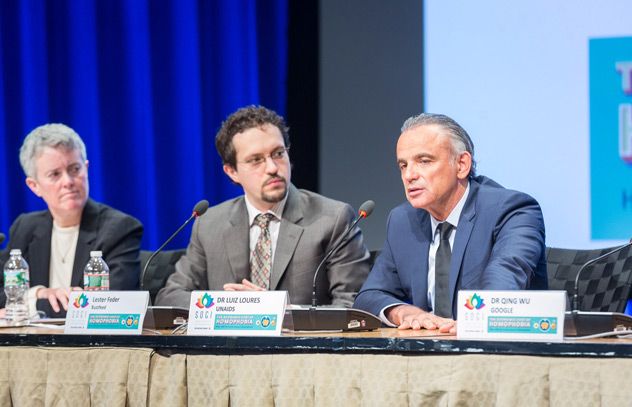
UNAIDS Deputy Executive Director Dr Luiz Loures speaking at the event.
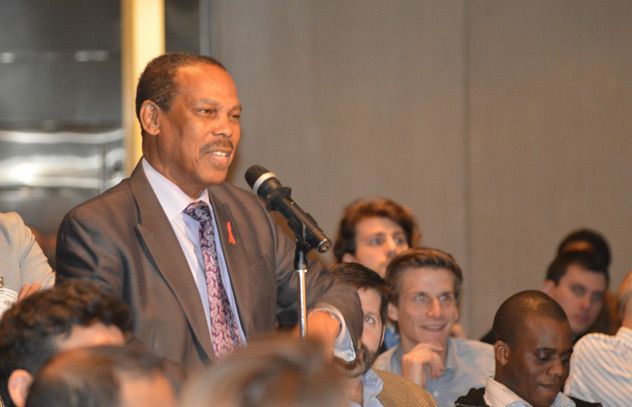
“The issue is not only the punitive and discriminatory laws but also that those impact attitudes in the society as a whole. The role of communities in changing the values and promoting justice for all is immense.” Dr Edward Greene, United Nations Secretary-General’s Special Envoy for AIDS in the Caribbean. Credit: UNAIDS.
Update
The economic costs and development impact of exclusion of LGBT people
14 March 2014
14 March 2014 14 March 2014New data show that the effects of homophobia and exclusion could be costing economies billions of dollars. In a panel discussion organized by the World Bank, participants discussed the findings of a new study that developed and tested an economic model to measure the cost of excluding sexual minorities. The panellists also debated the broader implications of a new wave of punitive legislations being passed in countries around the world.
The study highlights that in India, where homosexual behaviour is criminalized and no protective legislation exists for lesbian, gay, bisexual and transgender (LGBT) people, it is estimated that up to 1.7% of GDP is lost in one year due to homophobia and exclusion of LGBT. The loss of labour productivity and output because of employment discrimination and the loss of life years due to early death or disability could generate costs of up to US$ 31 billion in India alone. These preliminary estimates were presented by Dr Lee Badgett from UMass Amherst, one of the major public research universities in America.
Panellists highlighted the need for continued stronger data and evidence on the impact of exclusion for development as well as the continued need for the mobilisation of the international community to protect marginalised groups from being excluded from development and health.
UNAIDS Deputy Executive Director Dr Luiz Loures was among the invited special guests and panellists, together with Ms Tracy Robinson, Commissioner, First Vice President, Rapporteur for the Rights of LGBTI Persons at the Inter-American Commission on Human Rights; Dr Amy Lind, Professor of Women’s Gender and Sexuality Studies at University of Cincinnati; Mr Dennis van der Veur, Head of Sector Cooperation with EU Institutions and EU Member States, FRA of the European Union, and Dr Qing Wu, Senior Economic Analyst at Google. The discussion was facilitated by Lester Feder from Buzzfeed.
Quotes
“Punitive laws are affecting our efforts to end the AIDS epidemic and are impacting countries’ economies. Inclusive, rights-based responses are the hall-marks of the AIDS response and offer platforms on which to build. We need more evidence and data to convince policy makers and politicians about the need to address LGBT issues and homophobia, to ensure protection of human rights and equity in health and development.”
“The issue is not only the punitive and discriminatory laws but also that those impact attitudes in the society as a whole. The role of communities in changing the values and promoting justice for all is immense.”
“Protection of human rights and empowering people are important for strengthening economic outcomes and sustainable development. The study on the economic cost of homophobia towards LGBT presented today that we have supported, is a clear example of how important it is to start looking at the economic implications of homophobia and exclusion to better inform how we can work on poverty reduction and inclusive development.”
“Every time a girl drops out of school in Pakistan, every time a man who has sex with another man gets HIV, and every time the Roma community is defamed, society pays a heavy price. Excluding sexual minorities is not only a human tragedy but it is also a significant self-inflicted economic wound, and so we at the World Bank need to listen to their voices.”

